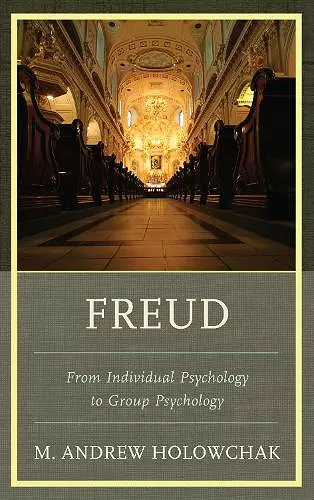Freud
From Individual Psychology to Group Psychology
Format:Hardback
Publisher:Jason Aronson Publishers
Published:13th Sep '12
Currently unavailable, and unfortunately no date known when it will be back

Freud: From Individual Psychology to Group Psychology, by M. Andrew Holowchak, explores Freudian psychoanalysis as a full-fledged science, as it relates psychoanalytically to issues of individual psychology (Individualpsychologie) and group psychology (Massenpsychologie). It answers questions such as “How effective did Freud perceive individual psychology to be?,” “What is group psychology?,” “To what extent did Freud think psychoanalytic investigation of group pathology could be curative of social ills?,” “How seriously did Freud take metapsychological explanation?,” and “How important were auxiliary hypotheses, borrowed (often uncritically) from other disciplines, in the formation of group psychology?” In sketching out the development of individual psychology and group psychology, Holowchak argues that for Freud, psychoanalysis was always essentially a procedure for investigating unconscious phenomena that allowed for explication and understanding of both individual and group issues.
Part I of Freud focuses on individual psychology, traces out the development of Freud’s thought on clinical therapy and analyzing the various clinical methods and theories Freud employed over the years. Holowchak critically examines the merit of Freudian psychoanalysis as a remedy for individual pathology. Part IIfocuses on group psychology, starting with an overview of the conditions influencing Freud’s shift to group-psychology issues and moving on to a psychoanalytic examination of other disciplines—non-sciences and sciences alike. Finally, Holowchak analyzes the worth of Freudian psychoanalysis as a remedy for group pathology.
Readers are given a comprehensive depiction as well as a critical analysis of the development of psychoanalysis in an easy-to-assimilate manner from Freud’s early days in analytic therapy, beginning with his stays with Charcot and Bernheim in France, to his mature thinking, where he develops notions such as the death drive and the structural model (id, ego, and super-ego) to compensate for theoretical defects in his earlier thinking.
Holowchak (Rider Univ.) has written what may be considered an unadorned close reading of Freud's works as they move thematically from a focus on individual psychology to group psychology. As such, the book's greatest use will be as a reference guide to the Freudian corpus. The book's critical insights are few and unoriginal, and the greatest part of the book is devoted to summary and citation of the Freudian opus. Attention to the historical context of Freud's thought is scant, and the author pays no attention to Freud's contributions to the Vienna Psychoanalytic Society (1906-18), the discussion of which would have illuminated more fully the turn from individual to group psychology. For the student first coming to Freud, this book will be helpful for its balanced view of the psychoanalytic project....Summing Up: Recommended. * Choice Reviews *
Holowchak has refused to adhere to the dogmas of Freud bashers. Although his insistence on taking Freud seriously as a scientist keeps Holowchak in the Pittsburgh tradition of skeptical scholarship on Freud that goes back to Laudan, Glymour, and Grünbaum, Holowchak eschews fashionable dogmas to create a new book that extends his previous work on Freud. Holowchak continues to display the originality that has marked his work on ancient philosophy and dreams, his Freudian novel, Hotel Bob, his work on the practice and philosophy of sport, as well as his scholarship on Thomas Jefferson. -- Michael Lavin Ph.D, 59th Medical Wing of the US Air Force
Holowchak’s Freud: From Individual Psychology to Group Psychology is a genuine tour de force.By scrupulously and critically analyzing Freudian psychoanalysis as a peculiar and often speculative science of unconscious mental processes, Holowchak shows how Freud’s theory is still of utmost philosophical relevance. Like Freud’s later work, this book is indispensable for anyone with an interest in culture and its accompanying discontents. Highly recommended! -- Andreas De Block Ph.D, Catholic University Leuven
A splendid book! Unusual in this day and age, Holowchak rises above the field torn between detractors and defenders of psychoanalysis to offer an utterly fair-minded appraisal of Freud’s opus. In a brilliantly lucid presentation, criticizing without global condemnation, appreciating within sober limits, he offers a wide-angle view of Freud’s efforts. Almost alone among commentators of today, he extends his analysis to include “metapsychology,” the frequently maligned speculative theory which Freud developed in his later years. Everyone with any interest in Freud will be intrigued by the careful tracing of the thought process which enabled him to turn the crude instinctual, sexual and aggressive urges of the early empirical hypothesis into the final theory’s cosmic powers of life and death. Because of the clarity of the presentation, the reader new to Freud studies will welcome this book as a superb introduction to the field. -- Rosemarie Sponner Sand
ISBN: 9780765709455
Dimensions: 235mm x 159mm x 21mm
Weight: 454g
202 pages